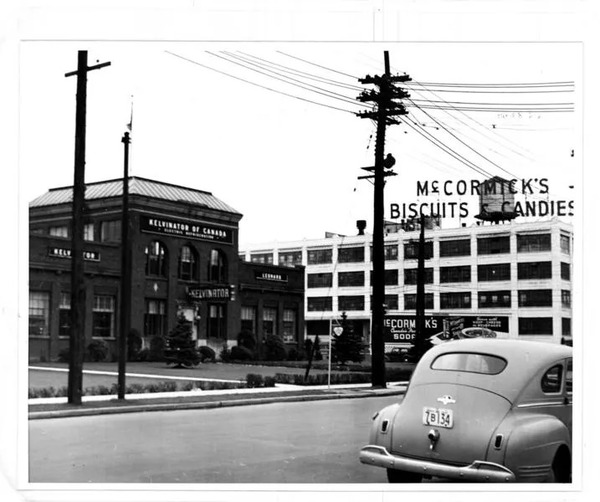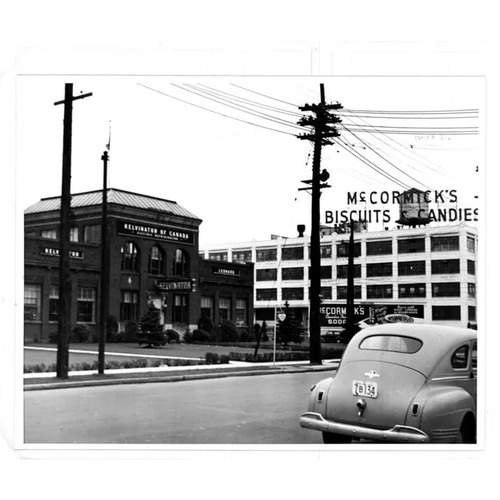
Source: Link
McCORMICK, THOMAS, manufacturer; b. 1 July 1830 in Dungannon (Northern Ireland); m. Catherine Armstrong (d. 1900) of Buffalo, N.Y., and they had seven sons and five daughters; d. 6 June 1906 in Newton, Kans, and was buried in London, Ont.
Thomas McCormick emigrated from Ireland about 1849. He settled briefly in Buffalo, where he met his future wife, and then moved on in the early 1850s to London, where he worked for several years as a grocery store clerk. In 1858 he began manufacturing confectionery – primarily hard candy – on a small scale for local, wholesale distribution, pitting himself against another London confectioner, Daniel Simmons Perrin, who had established his business four years earlier. McCormick styled his wholesale firm the Dominion Steam Confectionery and Biscuit Works in obvious emulation of Perrin’s Forest City Steam Confectionery and Biscuit Works.
Despite this seemingly brash challenge, McCormick was a cautious entrepreneur who gradually built up his trade, relying upon his modest profits for growth and taking care not to overextend himself with creditors. In 1872 he built larger premises to service his growing business and briefly took in a silent partner, A. Keenleyside (probably Anthony Keenleyside), to help finance his expansion. By the end of the decade McCormick had extended his trade throughout southwestern Ontario and was again in sole charge of his operation, which had been incorporated as the McCormick Manufacturing Company Limited in July 1879.
If McCormick was prudent in financial matters, he was innovative in other aspects of his business. He became, for example, one of the first Canadian manufacturers of food products to adopt unit packaging for retail sales when, in 1880, he began distributing soda-biscuits in three-pound paperboard boxes. Prior to this time, biscuits, or crackers as they were known in the United States, were distributed to retail stores in bulk. With the introduction of sanitary and easily handled packaged products by McCormick and other manufacturers, the days of the cracker-barrel, ubiquitous symbol of 19th-century food distribution, were numbered. In the 1890s McCormick adopted another marketing technique: the use of trade names and trade marks. He began distributing Jersey Cream Sodas, a premium product so named to differentiate it from his standard goods, but also to form a link with the consumer, who was expected to recognize its superior qualities and remain loyal to the brand. In a related bid for recognition, McCormick adopted the trade mark of a youth garbed in colonial attire to distinguish his line of food products. In this endeavour he was following the lead of manufacturers such as the Quaker Oats Company in the United States, with its smiling Quaker figure, and the Tillson Oats Company of Tillsonburg, Ont., with its genial Scotsman. Like John Warren Cowan, who adopted the maple leaf as his brand, McCormick sought product identification and the projection of a suitable image to consumers.
By the turn of the century McCormick was manufacturing for nationwide distribution and advertising in major newspapers across the country. Upon his death in 1906, his eldest son, George Gleeson, who had been associated with the firm since the early 1890s and was vice-president, took charge of it. In 1926 McCormick Manufacturing absorbed several regional concerns and its long-time competitor, D. S. Perrin and Company, becoming in the process the Canada Biscuit Company.
Thomas McCormick had been an active supporter of the Methodist Church and the Conservative party. His personal involvement in politics, however, was limited to serving on London City Council in the 1870s. A founding member of the Board of Trade in 1881, he was a director of the Agricultural Savings and Loan Company. As well, he sat on the board of Victoria Hospital in London, and he built and maintained there the T. McCormick Home for Aged People. At the time of his death, he was financing the construction of facilities for indigent consumptives at the Muskoka Cottage Hospital near Gravenhurst, Ont. McCormick died in Kansas, returning from a visit to California which he had taken in the vain hope of improving his declining health. He was survived by four sons and two daughters. That McCormick’s product lines remain represented on Canadian retail shelves today is perhaps the greatest tribute possible to an innovative and principled manufacturer.
AO, RG 22, ser.321, no.8719. Baker Library, R. G. Dun & Co. credit ledger, Canada, 19: 13 (mfm. at NA). Mount Pleasant Memorial Gardens (London, Ont.), Burial records. Univ. of Western Ont. Library, Regional Coll. (London), Robert Morrison papers. London Advertiser, 7, 11 June 1906. London Free Press, 8 June 1906. R. J. Burns, Paperboard and paper packaging in Canada, 1880–1930 (Environment Canada, National Parks Service, Microfiche report, no.393, 2v., Ottawa, 1989). Canadian album (Cochrane and Hopkins), 4: 488. Canadian Grocer (Toronto), 15 June 1906: 57. Middleton and Landon, Prov. of Ont., 4: 319.
Cite This Article
Robert J. Burns, “McCORMICK, THOMAS,” in Dictionary of Canadian Biography, vol. 13, University of Toronto/Université Laval, 2003–, accessed March 2, 2026, https://www.biographi.ca/en/bio/mccormick_thomas_13E.html.
The citation above shows the format for footnotes and endnotes according to the Chicago manual of style (16th edition). Information to be used in other citation formats:
| Permalink: | https://www.biographi.ca/en/bio/mccormick_thomas_13E.html |
| Author of Article: | Robert J. Burns |
| Title of Article: | McCORMICK, THOMAS |
| Publication Name: | Dictionary of Canadian Biography, vol. 13 |
| Publisher: | University of Toronto/Université Laval |
| Year of publication: | 1994 |
| Year of revision: | 1994 |
| Access Date: | March 2, 2026 |



